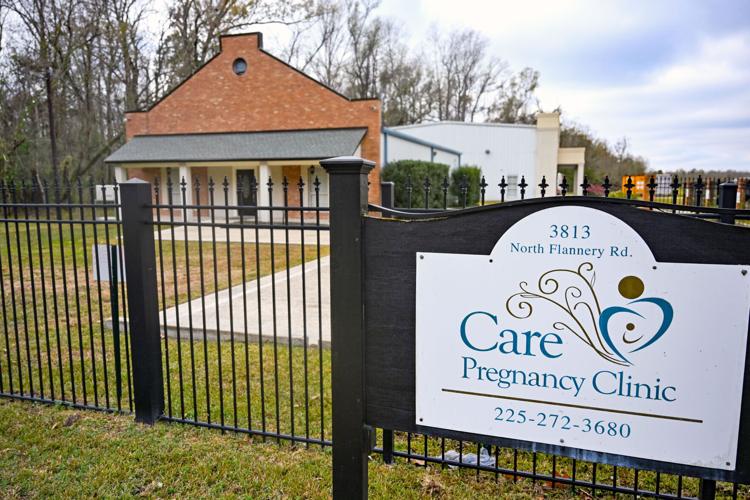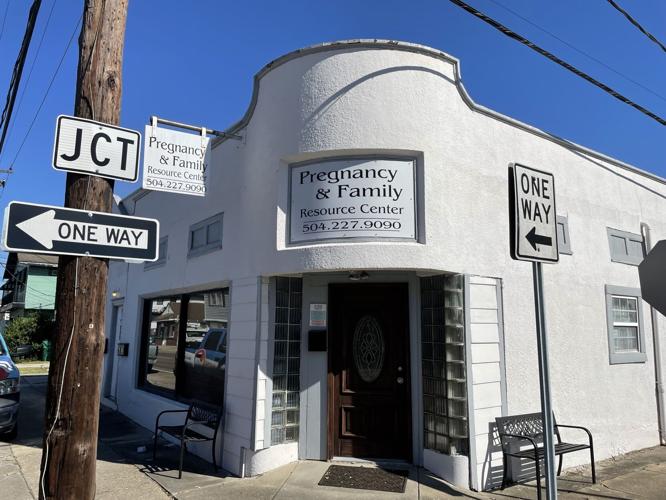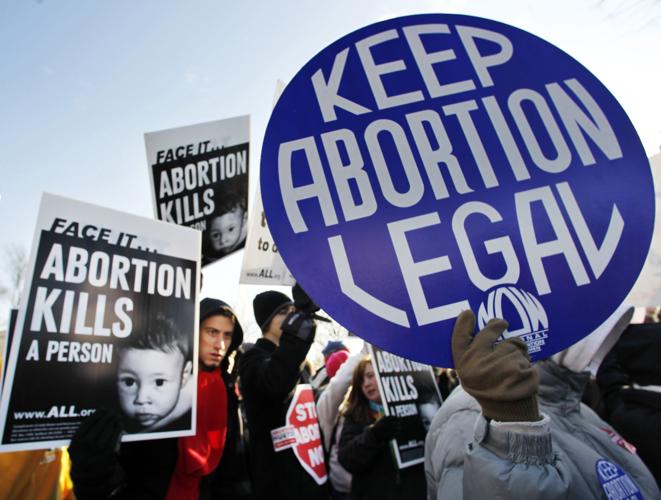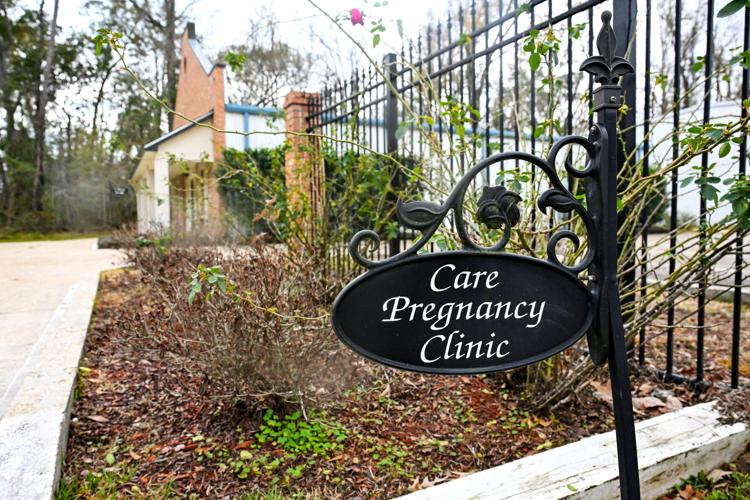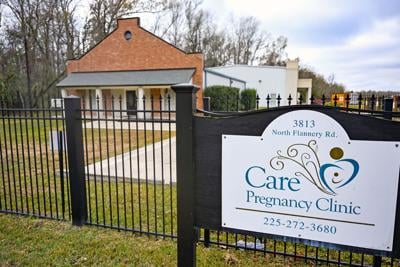For years, Louisiana officials have funneled millions in federal cash meant for poor families to controversial anti-abortion counseling centers that offer services like pregnancy tests, ultrasounds and abstinence-based sex education.
Now that practice is under threat.
As President Biden’s administration weighs tightening rules over how states can spend dollars from the federal Temporary Assistance for Needy Families program, anti-abortion activists have said those proposed changes could cut funding to so-called crisis pregnancy centers — spurring a political fight between Louisiana conservatives and Biden’s administration.
Louisiana is one of at least five states that partially fund such centers with TANF dollars. Records show the state has sent over $6 million in TANF funds since 2019 to its Alternatives to Abortion Initiative, which in turn distributes grants to a list of contracted facilities.
But the Biden administration’s proposal, which is not yet final, says centers that provide counseling to women only after they become pregnant likely don’t adhere to the TANF program’s goal of stopping premarital pregnancies.
Support for crisis pregnancy centers has persisted at the Louisiana Capitol since the U.S. Supreme Court overturned Roe v. Wade in 2022 and nearly all abortions became illegal in the state. Groups on both sides of the abortion debate have since described the centers as one of the anti-abortion movement’s main responses to the ruling. By stemming the flow of federal cash, the new rule could thus spell a major shift in the kinds of services available to people experiencing unplanned pregnancies in the post-Roe landscape.
“The way that it has been is the federal government defers to the insight and the knowledge at the local level,” said Ben Clapper, director of Louisiana Right to Life, the state’s powerful anti-abortion lobby. “We believe that’s preferable to basically shifting that to a D.C. bureaucratic decision.”

The nonprofit Community Center for Life, Inc. operates this "Pregnancy and Family Resource Center" in Gretna, Louisiana.
Pregnancy care and federal dollars
Anti-abortion interests tout Louisiana’s more than 30 crisis pregnancy centers as places that sometimes offer the only semblance of pregnancy-related care in a community, especially in the state’s rural reaches. The centers advertise ultrasounds, pregnancy tests and parenting classes and hand out diapers and strollers. They counsel women against receiving abortions and urge an abstinence-only approach to sex education laid out in the Alternatives to Abortion Initiative’s list of “core services.”
Abortion rights groups and some medical researchers have accused crisis pregnancy centers of lying to women about the safety and potential risks of abortion, bringing scrutiny in recent years upon the practice of sending TANF dollars to the centers. Lift Louisiana, a New Orleans-based group that advocates for reproductive rights including abortion access, argued in a 2022 report that crisis pregnancy centers promote religious content, medically inaccurate information about abortion outcomes, and don’t file detailed reports on their use of taxpayer dollars.
Yet anti-abortion Louisiana Democrats and Republicans alike have agreed for years on sending cash to those facilities. Lawmakers in 2003 established the state’s Alternatives to Abortion program, which directs contractors to promote four “core services”: healthy childbirth, full-term pregnancy, parenting or adoption as an alternative to abortion, and abstinence education.
State Department of Children and Family Services records show the program has sent about $1.2 million annually from the federal program meant to help poor families to crisis pregnancy centers since 2019. Under a 2022 mandate from the state Legislature, the Alternative to Abortion program will receive another $1 million in TANF dollars in the 2024 fiscal year, a DCFS spokesperson said, putting the total amount of TANF money received by the program at just over $2.2 million annually.

The exterior of Caring to Love Ministries, a crisis pregnancy center, as seen on Saturday, January 6, 2024.
DCFS documents offer a glimpse of the services the centers provide. Documents filed in 2020 by Caring to Love Ministries, a Baton Rouge-based crisis pregnancy center, say staff provided 1,100 counseling sessions, 940 “health risk assessments” and gave “abstinence education” to 200 people that year, among other services.
Kathleen Richard, director of Life Choices of North Central Louisiana in Ruston and President of the Louisiana Pregnancy Center Coalition, warned that those kinds of services could disappear without TANF support.
“That’s what these funds did in the state of Louisiana last year,” Richard said. “That’s what it comes down to — women who are in the ‘Uh-oh’ moment and are looking for support and asking, ‘How can I prepare for this?’”
But crisis pregnancy centers’ critics note that reports they file with the state contain few details about what the counseling sessions, so-called “risk assessments” and other services provided to those women entail.
That leaves state officials with few ways to gauge the centers’ impact, they say.
“There aren’t metrics measuring, one, whether or not these services were resulting in healthier births,” said Michelle Erenberg, Lift Louisiana’s director. “But more specifically for TANF, the goal was to prevent out-of-wedlock pregnancies. And there’s been no metric of any sort evaluating whether these pregnancy centers were having any impact on those pregnancies.”
Opposition from conservatives
The language of the rule change pending before the federal Department of Health and Human Services names crisis pregnancy centers specifically, saying they must be able to show that ongoing and past expenditures “actually accomplishes the TANF purpose.”
People on both sides of the abortion debate in Louisiana say it’s unclear how the change could ultimately affect crisis pregnancy centers receiving TANF money. Once a rule is final, it’s rare for Congress to strike it down; but a senior HHS official said it would be impossible to speculate on how a rule that has not been finalized might be applied.
Still, Louisiana state and federal lawmakers have signaled vigorous opposition to the proposal in recent weeks, calling it a political foil by abortion-rights activists and Democrats.

FILE - In this Monday, Jan. 24, 2011 file picture, anti-abortion and pro-choice activists stand next to each other in front of the U.S. Supreme Court in Washington during a rally on the anniversary of the Roe v. Wade decision. Americans, regardless of generation, are deeply conflicted as they wrestle with the legality and morality of abortion, with a substantial majority identifying themselves as both "pro-choice" and "pro-life," according to a sweeping new survey. The detailed and nuanced findings were released Thursday, June 9, 2011 by the Public Religion Research Institute, based on a survey of 3,000 adults _ one of the largest ever to focus on Americans' views of abortion. (AP Photo/Manuel Balce Ceneta) ORG XMIT: NY431
In a letter to Health and Human Services Secretary Xavier Becerra last month, U.S. Sen. John Kennedy, R-Madisonville, and U.S. Reps. Clay Higgins, R-Lafayette, and Garret Graves, R-Baton Rouge, joined 16 other congressional Republicans in criticizing the proposed rule. They called it an “arbitrary and capricious” attack that “is targeting pregnancy centers for their pro-life mission.”
Louisiana state Rep. Larry Bagley, R-Stonewall, signed a separate letter penned with state lawmakers from Missouri, Indiana, Ohio and Pennsylvania slamming the proposal, arguing that the rule could eliminate a large quantity of services the centers provide at low cost.
Abortion rights advocates, meanwhile, have signaled support for the rule change. Lift Louisiana submitted a public comment supporting the proposal. And in an interview, Erenberg said the rule presents a chance for the federal government to better scrutinize the outcomes of tax dollars being directed to poor families.
New trend in post-Roe landscape
After efforts sputtered last year to soften Louisiana’s abortion ban, how the state engages with crisis pregnancy centers could prove fertile ground for debate over the future of reproductive care, with lawmakers across the political spectrum proposing legislation dealing with the facilities.
Anti-abortion lawmakers have rallied behind efforts to support them.
In last year’s legislative session, Sen. Beth Mizell, R-Franklinton, carried a bill that created tax breaks for crisis pregnancy centers, arguing that the centers offer lifelines for pregnant women in rural pockets of the state. Outgoing Gov. John Bel Edwards, an anti-abortion Democrat, signed the bill in June.
Erenberg, the Lift Louisiana director, said crisis pregnancy centers appear to be “the only solution that the anti-abortion movement has offered up to the issue of forcing people to carry pregnancies to term” since Roe fell.
State Rep. Aimee Freeman, a pro-abortion rights New Orleans Democrat, introduced legislation in 2022 calling for a different approach than Mizell’s: more stringent standards for reporting the results of crisis pregnancy centers’ services, and the way they use federal tax dollars.
"If the purpose (of the centers) is to produce healthy outcomes for all pregnancies, show that to me,” Freeman said.

